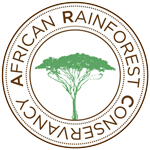Before I became the Executive Director of the African Rainforest Conservancy (ARC), I had never heard of the rainforests in the Eastern Arc Mountains! Most people I talk to about rainforests in Africa have never heard of these rainforests either.
This is particularly strange because the rainforests in these mountains have an exceptionally high concentration of species found exclusively in this region. At least 96 vertebrate species are endemic: 10 mammal, 19 bird, 29 reptile and 38 amphibian species. This includes four endemic or nearly endemic species of primate – the Sanje Mangabey, the Iringa Red Colobus, the Mountain Galago and the new Kipunji monkey that forms its own monotypic genus. A further 71 vertebrate species are near-endemic. At least 800 vascular plant species are endemic, almost 10% of these being trees.
This is particularly concerning because these rainforests are a vital source of non-timber forest products, such as water, fuel, and food for millions of rural people. The forests are a vital source of waterpower for Tanzania; rivers flowing from the mountains supply water to hydropower stations that generate over 40 percent of the nation’s electricity. The rivers also supply water for domestic, agricultural, and industrial purposes – supporting the livelihoods of millions of people.
And yet, only 30% of the ancient trees in the coastal and mountain rainforests of Tanzania remain standing, due to clearing from farming and logging. Burning and clear-cutting forests only accelerates the release of carbon dioxide into the atmosphere. Tropical forests are like big sponges, if cleared, there are less trees to soak up the carbon dioxide. It is the people living in developing countries, like Tanzania, who will suffer the most from climate change. Without increased efforts from the ARC and its partners on the ground, climate change will continue to devastate communities in the Eastern Arc Mountains and around the globe.
Since 1991, the ARC has been conserving Tanzania’s Eastern Arc Mountains and Coastal Forests by raising the capacity of local conservation networks and encouraging sustainable economic development. With a focus on integrated forest conservation, including the planting of over 15 million trees, the ARC has been at the forefront of protecting species biodiversity and combating global climate change for over two decades, believing that forests are better managed when the men and women who live in and around them are directly involved in their management. Our holistic approach to conservation and community development simultaneously improves the environment and the lives of the local people who are the stewards and guardians of the forests.
With the COP 21 Climate Talks around the corner and the urgency of climate change ever increasing, we ask YOU to DONATE to the Coffee Fund this #GivingTuesday rather than spending your money on shopping events like Black Friday and Cyber Monday!
We hope you choose the ARC this #GivingTuesday!
When spreading the word on social media use the following hashtags: #GivingTuesday, #SaveUdzungwaScarp, and #ClifftonDrySocialResponsibility.


Leave A Comment